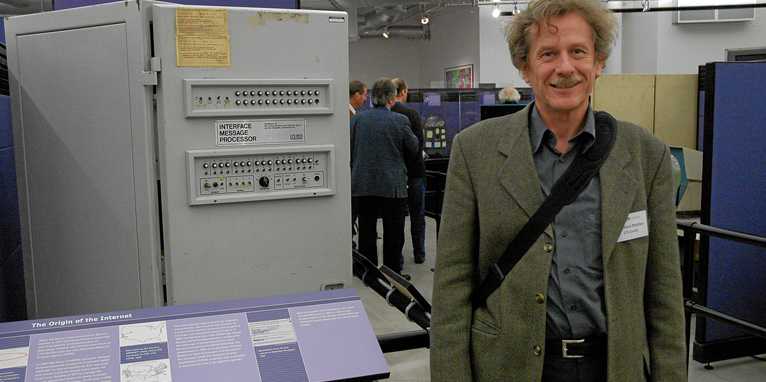A pioneer of the Swiss internet to retire
Professor Bernhard Plattner, one of the fathers of the Swiss internet and a pioneer in computer networks is set to retire at the end of July 2015. The Computer Engineering and Networks Laboratory, which he co-founded, will simultaneously celebrate its 25th anniversary with an open day.
Professor Bernhard Plattner is a picture of calm. He is obviously at peace with all that he has accomplished and the fact that he is now starting a new chapter in his life. He has devoted 30 years of his life to researching computer networks and the internet at ETH Zurich, working as a full professor since 1994. He will officially enter retirement on 1 August.
He has already made plans for the time thereafter, and they have nothing to do with his professional activities – at least not all of them. This computer engineering professor, who admits to using the internet extensively in his free time, would like to improve his cooking skills. In a sense, he will be returning to his roots: Long before studying electrical engineering at ETH Zurich, back when the professor was a young high school student, he earned his first cash as an assistant cook during the summer holidays, eventually rising to the rank of Entremetier (entrée preparer). His favourite food: fish dishes of every variety, including sushi.
Plattner registered the first Swiss internet domain
Plattner, born in 1950 in Bern, experienced the emergence of the entire internet firsthand and played a decisive role, especially here in Switzerland. As early as 1987, he registered the .ch domain for Switzerland. That same year, Plattner was also actively involved as the Swiss federal government and universities co-founded the SWITCH foundation, serving as its first executive director and interim head of the management board. SWITCH operates the university networks for all Swiss universities and manages the registration of all .ch and .li domain names. Switch was also selling these domains up until the end of 2014; this task has now been transferred to various internet service providers.
Focused on the benefits
“At the end of the eighties, nobody had ever conceived that the internet might have a commercial application,” he says. At that time it was primarily a means of exchanging emails between universities and providing researchers with access to high-performance computers.
Discussion with Plattner quickly reveals that it is the opportunities presented by the internet and its potential that matter to him. He wants to know how this “network of networks” works and how it can be even better. At the same time, the applications, indeed the benefits, are also very important to him. This is something that Plattner passed on to all of his doctoral students: “Your research must meet three criteria: First, it should be something that nobody has ever done before. Second, your solution must be better than all comparable, earlier approaches. And third, the results should be useful.”
His commitment to the spread of the internet in Switzerland and particularly in higher education took many forms. Alongside internationally renowned publications, programmes such as ETH World, which he managed from 2002 until 2005, also played a significant role. As one of the many activities of ETH World, research was carried out into modern teaching methods and remote collaboration – sometimes referred to as “virtual presence”. The external page Neptun project continues to enable students and employees to acquire laptops at low cost to this day. Meanwhile, the services provided by Neptun have been available to all Swiss universities since 2007. An internet telephony service was also developed for staff and students of ETH Zurich, although this was discontinued in 2013. Plattner himself was one of the pioneers in the field of internet telephony. “I have not had a landline telephone connection since 2002 and since that time I have only made and received calls via the internet.” It is only social networks he avoids. The main reason he states is time, but he also thinks this could be a generational thing.
Expectations for the future of the internet
Plattner foresees increased blurring of the boundaries between the virtual and real worlds. For him, this includes things such as cars being able to call the police and emergency services of their own accord after a crash, or smartphones that automatically make emergency calls in the event of an avalanche – exactly like the services provided in the app developed by ETH spin-off external page Uepaa Swiss Alpine Technology.
In Plattner’s opinion, there is also a need for fundamental changes to the internet: “The internet itself must be revamped, because the underlying technology is now 30 years old.” With this in mind, researchers at the Computer Engineering and Networks Laboratory, which was co-founded by Plattner and Professor Albert Kündig back in 1990, are focusing on how governance of the internet can be improved. The key focus here is on “software-defined networking” (SDN). The goal of this technology is to manage the internet more efficiently through better coordination. Questions that still remain open include, above all else, just how exactly this coordination should be achieved, and to what extent this might affect the security of the network.
Generally speaking, the computer engineering professor considers the protection of privacy to be another important issue. He advises all his students to always apply a healthy level of caution when using the world wide web. But one should not be overly fearful, either, he adds: “Every new technology has both positive and negative sides – that is unavoidable.”
His legacy lives on
Plattner is not concerned about the continuation of research at his Laboratory, which is part of the Department of Information Technology and Electrical Engineering. He knows that it will continue to exist without him. Laurent Vanbever, who has been an assistant professor at ETH Zurich since January 2015, will continue Plattner’s research in this area. Plattner’s ideas will also live on in other ways. With a slight grin, he explains that maybe it was not enough for the Nobel Prize, but he did manage to supervise 52 doctoral students and 300 to 400 master’s students. “This,” he says with great conviction, and a certain sense of pride, “is the most significant impact one can possibly have as a professor.”
Anniversary celebration on 5 June 2015
On Friday, 5 June, the Computer Engineering and Networks Laboratory (TIK) is opening its doors for its anniversary celebration. The event will open with a lunch at 12.30 pm, followed by a selection of presentations from 2 pm onwards. Finally, there will be a get-together for staff, students and alumni of the Laboratory from 7 pm onwards at Zunfthaus zur Saffran.
Find out more about the programme at tikanniversary.ethz.ch.


Comments
No comments yet